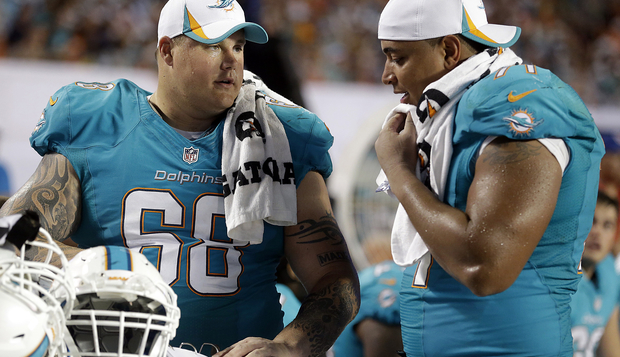 Bullying in the dressing room, the court or the playing field is always something a coach needs to keep an eye on, said St. Thomas women’s volleyball coach Don McKay.
Bullying in the dressing room, the court or the playing field is always something a coach needs to keep an eye on, said St. Thomas women’s volleyball coach Don McKay.
“We’ve had a setter who, if you didn’t do as she wanted you to do, you didn’t get the ball,” said McKay about a team he coached previously. “As a coach, I’d want to know why the ball wasn’t being distributed and sometimes you’d find out that it’s a personal thing off the court.”
Bullying in sports has become a hot topic after the Miami Dolphins’ Richie Incognito was suspended earlier this month for bullying teammate Jonathan Martin. Incognito’s alleged offences include racial slurs in the locker room, as well as texts threatening the life of Martin’s family.
McKay, who has coached various sports in New Brunswick for 37 years, says bullying doesn’t always take such extreme forms.
“In baseball it’s sometimes trying to get a call, so sometimes coaches can be intimidating to umpires. In basketball there’s a lot of trash talk.”
St. Thomas athletics has strict policies when it comes to bullying and teams welcoming first-year players. Rookie initiations are not tolerated by the school, as well as any form of hazing. The Code of Conduct for St. Thomas athletics defines hazing as any act that could endanger the mental and physical health of a student such as initiations.
STU hasn’t acknowledged many problems with bullying, but the school has had some issues with rookie parties in recent years, with the men’s volleyball and rugby teams. Both situations involved excessive drinking. In 2012, a rugby party included rookie initiation. The team was suspended for a game. In 2010, volleyball player Andrew Bartlett died after a team party, which included heavy drinking and hazing.
For most players, however, the bullying comes from their opponents.
Third-year basketball player Hilary Goodine has been on the receiving end of some harsh words on the court.
“She got called on a charge and she went to go kick me, and they gave her a technical. Then she said ‘you’re a slut’ and ran out.”
Sometimes even coaches, supposedly role models for their players, can get caught up in the competitiveness of the game.
“I was going up for a lay-up, and I must have been kind of playing good that game, and the coach yelled at their players to take me out at the knees,” said Goodine. She remembers her dad, her coach at the time, was furious.
Tommie basketball player Ben Cripps is also no stranger to overly competitive coaching. He remembers one coach who threw chairs during games while coaching a middle school team.
“At halftime he’d freak out if we were down by 30. He’d scream and go on and slam things,” said the rookie. “We had to fold the team [because] he was so insane.”
A calm coach will often put out a disciplined team, while a more intense coach can sometimes produce overly vocal players. Coach McKay thinks sometimes a coach can push a player too far.
“Every coach loves to have that very competitive player, a do-anything-to-win, run through the walls type,” said McKay. “There’s a fine line sometimes where a coach can push a player to do more, to want more, and sometimes it’s at the expense of another player.”
McKay is a vocal coach, so when players come into program he does his best to make them aware of what to expect from him. If there is something he needs to tell a player about their game, he takes them aside to work it out separately. Knowing which players can take harsh criticism and which ones can’t is a key for coaching in any sport.
With STU’s history with hazing and bullying, more people are trying to be sensitive to their surroundings. Cripps said he doesn’t feel he’s been bullied as a rookie.
“Carrying some bags, carrying some water … I mean, that’s some basic stuff I don’t mind doing at all.”
McKay says it’s important to talk about those problems to show bullying won’t be tolerated.
“You have to have policies. You have to have consequences. You have to stay on top of it,” said McKay.
